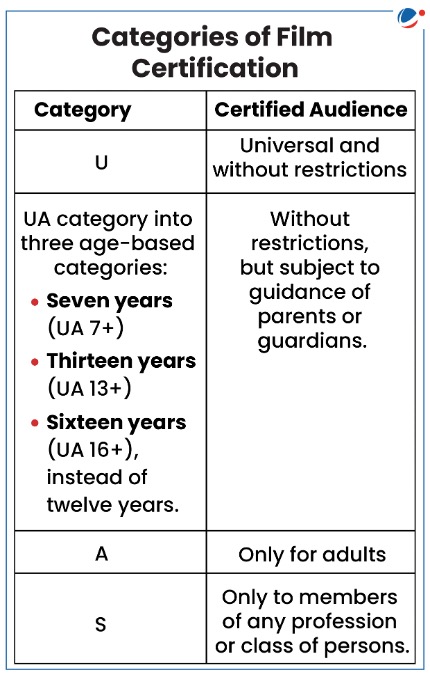Why in the News?
Under the Cinematograph (Amendment) Act, 2023, the Ministry of Information and Broadcasting, has notified the Cinematograph (Certification) Rules, 2024, replacing the Cinematograph (Certification) Rules, 1983.
Film Certification in India
- Film certification is the end product of the process of previewing of film, and it includes-
- a decision either not to allow a particular film or public viewing or
- to allow it with certain deletions and/or modifications or
- at least proper categorization of the films.
- The CBFC or the Central Board of Film Certification was set up in Mumbai with several regional offices to regulate the public exhibition of films under provisions of the Cinematograph Act, of 1952.
- CBFC is a Statutory body under the Ministry of Information and Broadcasting.
 9 regional offices: Mumbai, Chennai, Kolkata, Bengaluru, Thiruvananthapuram, Hyderabad, New Delhi, Cuttack and Guwahati.
9 regional offices: Mumbai, Chennai, Kolkata, Bengaluru, Thiruvananthapuram, Hyderabad, New Delhi, Cuttack and Guwahati.
- The Board of Film Certification shall also ensure that the film-
- Is judged in its entirety from the point of view of its overall impact; and
- Is examined in the light of the period depicted in the films and the contemporary standards of the countryand the people to which the film relates provided that the film does not deprave the morality of the audience.
- The SC judgement in S. Rangarajan Etc. vs P. Jagjivan Ram, 1989 said that a film motivates thought and action and assures a high degree of attention and retention as compared to the printed words.
- Therefore, certification by prior restraint is not only desirable but also necessary.

Key Aspects in the Cinematograph (Certification) Rules, 2024
- Terms of office: A member of the Board shall hold office during the pleasure of the Central Government.
- Representation of women: It stipulates that 1/3rd of the members in the Board shall be women and preferably half shall be women.
- Temporary absence of Chairperson: Central Government may nominate a member of the Board who will discharge the functions of the Chairperson until the Chairperson resumes their duties.
- Constitution of advisory panels: The Central Government shall constitute an advisory panel at each of the regional offices of the Board.
- Improved efficiency: By reducing timelines for the processing of film certification and adopting complete digital processes for eliminating all transactional time.
- It will streamline and modernize the film certification process for the digital age.
- Further classification of UA: Sub-division of the existing UA (Unrestricted with Caution) category into three more age-based categories (See infographic).
- It will ensure young viewers are exposed to age-appropriate content. It would be voluntary.
- Provision for priority screening: For expediting the screening of film screening for certification, in case of any urgency felt by filmmaker(s) due to their prior commitments to release the film.
- This step is in line with the motto of ‘Ease of Doing Business’.
- Change of Category of Film for Television: Recertification of the edited film for Television broadcast, as only Unrestricted Public Exhibition category films can be shown on television.
- Perpetual validity of certificates: Removal of the restriction on the validity of the certificate for 10 years.
Other Key Provisions of Cinematograph (Amendment) Act, 2023
|
Issues with Film Certification in India
- Over-the-top (OTT) platforms: Film certification does not regulate content on over-the-top (OTT) platforms.
- Censorship and Content Restrictions: Excessive censorship could potentially hinder artistic freedom and creative expression.
- Delays: There are concerns about the CBFC's capacity to handle the volume of films submitted for certification in a timely and efficient manner.
- Fails to tackle online piracy: It falls short in addressing the complexities of online piracy, leaving loopholes such as mirroring servers.
- It does not address instances of film piracy that originate in foreign countries.
- Legal Challenges: The certification process has been challenged in court multiple times.
- Recently a petition was filed demanding the revocation of the certificate for the movie ‘Adipurush’ for allegedly hurting religious sentiments.
Conclusion
While streamlined processes and diverse representation in the revamped Cinematograph (Certification) Rules, 2024 are positive steps, concerns linger over censorship, content control etc. Striking the right balance between creative freedom and societal responsibility remains the true test ahead.
Related news
|




